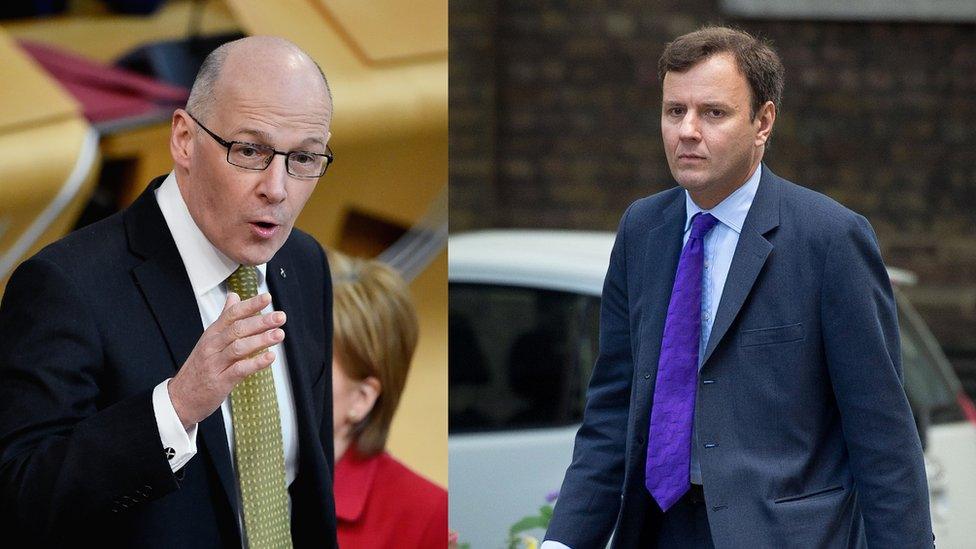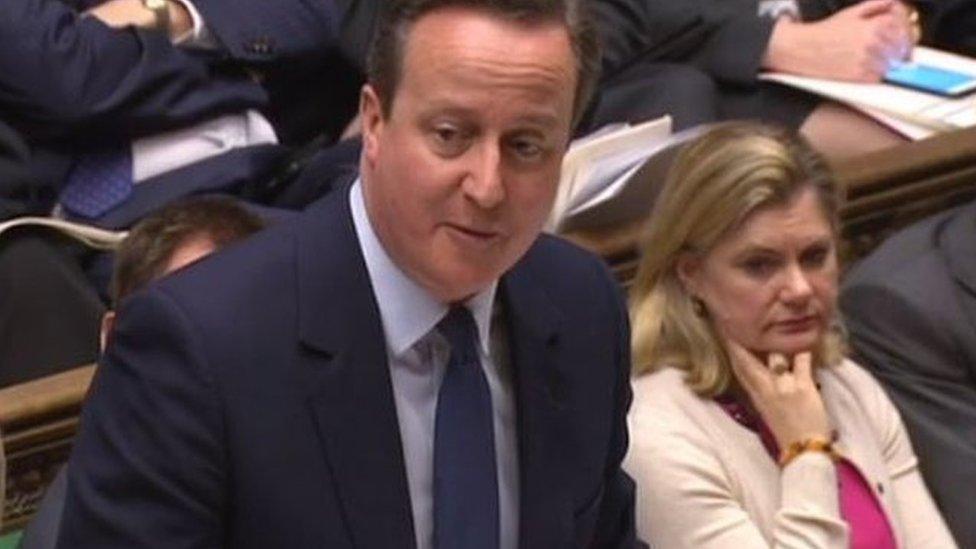'Final hurdle' in fiscal framework devolution talks
- Published

Finance Secretary John Swinney and Chief Secretary to the Treasury Greg Hands are to meet for further talks
Representatives of the Scottish and UK governments are to meet for last-ditch talks to establish a fiscal framework for new devolved powers.
Finance Secretary John Swinney said he hoped a deal could be done this week.
Holyrood's devolution committee has set a deadline of 23 February if there is to be time to scrutinise the agreement.
Mr Swinney's Treasury counterpart Greg Hands warned that walking away from a deal would be "letting down the people of Scotland".
The two sides both tabled fresh proposals in the deadlocked talks last week, with Mr Swinney warning that "very significant issues" remain.
The parties disagree on their interpretation of the "no detriment" principle laid out by the Smith Commission on new powers for Scotland, which stipulates that neither the UK or the Scottish budgets should be left worse off by a deal.
Writing in the Scotland on Sunday newspaper, external, Mr Hands said both governments had "shared an objective to make the Scottish Parliament one of the most powerful devolved administrations in the world".
He said there remained an obstacle at the "final hurdle", saying the deal the Scottish government was proposing is "not fair".
Population growth
The key disagreement concerns population, with that of Scotland set to grow more slowly than that of the UK in coming years.
The Scottish government backs a model known as "per capita indexed deduction", which would compensate financially for the slower population growth.
Mr Swinney said this was the best way of satisfying the "no detriment" principle, but Mr Hands said it was "not logical" and instead proposes a model which would update Scotland's population share of tax revenue over time.
David Cameron: "I want the SNP, here and in Holyrood, to have to start making decisions."
First Minister Nicola Sturgeon, who has exchanged letters with Prime Minister David Cameron on the matter, claimed the Treasury's position amounted to an "almost £3bn cut" for Scottish budgets over 10 years.
Mr Cameron responded that it would be "very difficult" for him to to explain to taxpayers in the rest of the UK that "Scotland would stop paying income tax into the central pot yet somehow still receive a share of it".
David Phillips, of the Institute of Fiscal Studies, told the BBC's Sunday Politics Scotland programme that there would need to be "goodwill" on both sides just to reach a "fudge".
He said: "It's a very complicated picture, because of the 'no detriment' principles and taxpayer principles in the Smith Commission report.
"You might think they are both very sensible principles, but it turns out with the Barnett Formula in place you can't have a system that satisfies both principles while being simple and transparent."
Fiscal forecasts
Mr Hands also said the UK government was unhappy about the Scottish government's proposal that it would set its own fiscal and economic forecasts.
MSPs had called for the Scottish Fiscal Commission to be given the power to set forecasts instead, but SNP members on the finance committee backed down after hearing evidence from Mr Swinney.
Holyrood's devolution committee wants both sides to present a "full explanation of their position" by its next meeting on 23 February, when they will be called to give evidence to MSPs.
Convener Bruce Crawford has warned there would be "very substantial impacts" on the Scottish Parliament's ability to scrutinise the deal before dissolution on 23 March if a deal is not struck soon.
Mr Swinney said: "Our proposal is with the Treasury and I hope, and believe, we can now agree the remaining outstanding issues this week."
However, Mr Hands said "the ball is fully in the court of the Scottish government", adding: "We must all hope they do not miss this opportunity".
- Published12 February 2016

- Published11 February 2016

- Published10 February 2016

- Published8 February 2016
